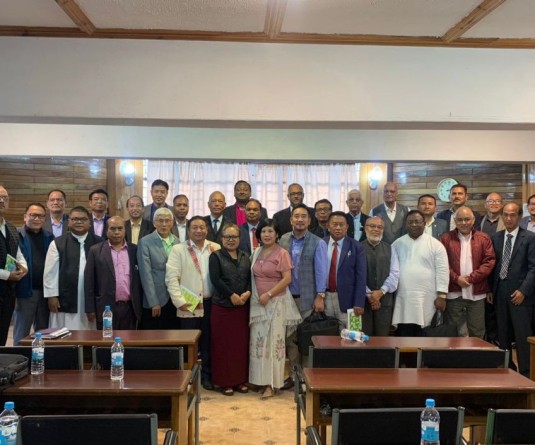
Mazie Nakhro
Mr. R.N. Ravi, the Deputy National Security Advisor and India’s Interlocutor for talks with the Nagas, has coined the term “shared-sovereignty,” which certain sections of the Naga people have come to believe as a possible way to resolve the seven-decade long Indo-Naga political problem.
The question is, can there be such a thing as a ‘shared-sovereignty’? Before we jump into answering it right away, we need to first understand the meaning of political sovereignty.
The French jurist and political philosopher Jean Boden (1530-1596) was possibly the most well-known political theorist on sovereignty. He has been long recognized for his oft-cited definition: “Sovereignty is the absolute and perpetual power of a republic.” Boden’s concept of sovereignty was derived from the final dissolution of Europe into several independent nation-states in the sixteenth century (see his work on “Of the True Marks of Sovereignty”).
Another legal and political theorist who had written much on the concept of sovereignty is Carl Schmitt (1888-1985). According to him, “Sovereignty is the highest, legally independent, underived power.” To gain a better grasp of his definition, let’s briefly elaborate these points:
First, sovereignty is a superlative power of the highest order. That’s why the Germans would say: Soverän ist, wer ber den Ausnahmezustand entscheidet, which can be translated, “a sovereign is he who decides on the exceptional case.” In other words, the essence of sovereignty is the political power both to decide what is an exception (as opposed to general constitutional rules or normal situational cases) and to make the decisions appropriate to that exception. This is often demonstrated during emergency situations (President Rule) when the Executive Head temporarily suspends (but not abrogates) all routine rules of the government and decides on an exception in order to create or recover social order when the existing one is threatened by chaos and anarchy. Other marks of sovereign power include the authority to declare war, make peace-treaty, appoint civil servants, grant pardon, hear final appeals, and so on. This being what sovereignty is, it logically implies that there can be only one sovereign entity (supreme authority) at a time in any given nation.
Second, sovereignty is a legally independent power. In internal matters of a nation, the ruler epitomizing sovereignty can temporarily transcend the legal order, because he is entitled to act when the legal system fails to answer the question of competence. This is a unique authority over the last decision, although it is not to be construed as a right to monopoly of power or dictatorial rule. On a somewhat similar vein but different level, the people of a land can assert sovereignty by functioning as a self-governing, independent entity and refusing to subject themselves to any external power outside their own geo-political territory. This is essentially what makes a sovereign state, which, according to Black’s Law Dictionary, is defined as “a state that possesses an independent existence, being complete in itself, without being merely part of a larger whole to whose government it is subject.”
Third, sovereignty is an “underived power,” meaning, it does not have to depend on another nation to give it. It is an inherent birthright as human beings made in God’s image. And by extension, sovereignty is something given to every people group. That’s why the standard position of the Naga Freedom Movement has always been the assertion of their own sovereignty instead of demanding it from India, because the Naga political issue is not a case of secession either from India or Myanmar. Put it differently, the question of Naga sovereignty is a matter of self-assertion and not something to be settled dependent upon the approval of some other external powers.
No doubt, R.N. Ravi is an admirable man who has come to understand the Naga people and their unique political history very well. But his idea of a “shared-sovereignty” is a fallacious theory, because sovereignty, by definition, is indivisible and thus unshareable. On the other hand, one has to appreciate his argument that ‘sovereignty lies with the people.” If this is really his understanding, then he must also admit that the Naga people, and not the Indian Government, have the ultimate right to decide on their own political future. And this is exactly where the Indo-Naga political problem could find its final resolution.




